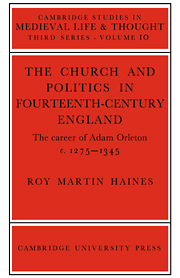Book contents
- Frontmatter
- Contents
- Preface
- Acknowledgements
- Abbreviations
- 1 APPRENTICESHIP
- 2 THE DIPLOMATIC ENVOY
- 3 THE DIOCESAN BISHOP
- 4 POLITICAL INVOLVEMENT
- 5 SUMMING UP
- APPENDIX I Worcester diocese: tables illustrating Orleton's administration
- APPENDIX 2 Letters and documents
- APPENDIX 3 Itinerary 1317–1345
- Bibliography
- Index
4 - POLITICAL INVOLVEMENT
Published online by Cambridge University Press: 24 October 2009
- Frontmatter
- Contents
- Preface
- Acknowledgements
- Abbreviations
- 1 APPRENTICESHIP
- 2 THE DIPLOMATIC ENVOY
- 3 THE DIOCESAN BISHOP
- 4 POLITICAL INVOLVEMENT
- 5 SUMMING UP
- APPENDIX I Worcester diocese: tables illustrating Orleton's administration
- APPENDIX 2 Letters and documents
- APPENDIX 3 Itinerary 1317–1345
- Bibliography
- Index
Summary
orleton and the chroniclers
Chroniclers have too readily made or marred the reputations of medieval men; from their folios step forth flesh-and-blood people larger than life, villains or saints. Seldom do we find subtle delineations of character viewed against the background of those circumstances, favourable or unfavourable, in which a man lived out his life.
Adam Orleton provides an example of a man damned by the prejudice and preconception of chroniclers, or to be more exact, of one chronicler in particular. To us he has come down as an unscrupulous ecclesiastical careerist, who abetted rebels in contempt of his oath of loyalty, successfully engineered the escape of a notorious traitor, fanned the smouldering hatred of baronial opposition, fostered the unlawful liaison of a queen, and master-minded a revolution which culminated in the imprisonment of a king, Edward II, whom he had long pursued with an implacable hatred and whose brutal death he contrived by means of a cryptic murder note. Not content with all that he insidiously sacrificed the royal chancellor, Robert Baldock, to a London mob insufficiently satiated by the particularly revolting murder of Bishop Stapledon, another of the king's ministers. Finally he emerged from semi-retirement, senile and half-blind, to fabricate a libellous polemic against his old enemy and ecclesiastical superior, John Stratford, the archbishop of Canterbury. This is a powerful story concocted of elements of truth, half-truth and pure fiction. The chronicler chiefly responsible was an obscure clerk, Geoffrey le Baker.
- Type
- Chapter
- Information
- Church/Politcs:Adam Orleton , pp. 102 - 198Publisher: Cambridge University PressPrint publication year: 1978



